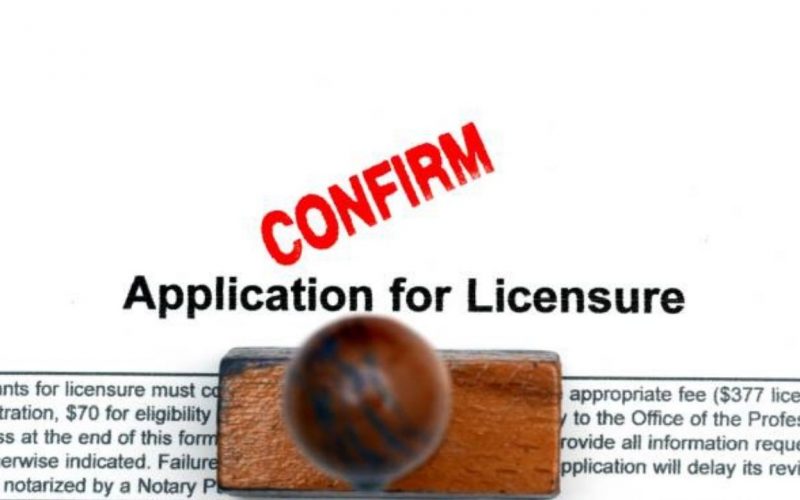When you start a new business, you will almost certainly need to register it in order to get a business license and other necessary permissions. Obtaining a license like a small business license can take a long time and a lot of money, so it’s crucial to know which ones apply to your company (and how to get them) before you start.
The majority of small businesses will require some type of business license, which will allow them to operate legally in accordance with federal, state, and local regulations.
The average cost of a company license is a few hundred dollars, plus renewal fees. Take your business registration seriously if you want to make sure you’re following all the rules for business licenses.
This article is for entrepreneurs who need to know the process for getting a small business license in the U.S.
What is a Business License?
A business license is your company’s formal registration that allows you to operate in your industry and jurisdiction. Before supplying goods or services, federal and local governments require small enterprises to obtain the necessary business licenses.
County governments gain from business licenses since they allow them to collect income, enforce zoning restrictions, and regulate which businesses operate inside their borders; nevertheless, a business license can also benefit your small business.
Getting a license helps business owners show their customers, employees, and other important people that their business is well-run and that their products and services can be trusted.
Can I Run a Business Without Registering?
You can run a sole proprietorship without registering, but you must register with your local government in order to collect and file state taxes. There’s nothing wrong with operating an unregistered business as long as it’s lawful and complies with all licensing and tax regulations.
Why are Business Licenses Needed?
You must first establish your company as a legal business organization before applying for any small business licenses or permits.
The Secretary of State can supply you with all the information you need to start a corporation or a limited liability company online (LLC).
Smaller businesses may decide to register as a sole proprietorship rather than a corporation or limited liability company.
You must register your business name as a “doing business as” or DBA at the local level for sole proprietorships. DBAs are usually filed with the county clerk or city clerk.
Fill out IRS Form SS-4 to apply for an Employer Identification Number (EIN) once your business entity has been registered. To file taxes, your business will require an EIN.
Once you have your DBA or have incorporated your business, you can apply for the small business permits you need.
Does a Small Business Need Permit?
Whether the business is a Sole Proprietorship, Standard Domestic Corporation, One-Person Corporation (OPC), or Partnership, a Business Permit will be required. Furthermore, regardless of the sort of business model, the Business Permit need will apply.
Types of Business Licenses
It’s not easy to figure out which form of license your firm will require. Small business licenses and permits are available at the municipal, county, state, and federal levels. Depending on the nature of your startup’s business, you may require more than one.
The following is a list of business licenses organized by municipal, state, and federal categories.
- Local and county business licenses and permits
- State licenses and permits
- Federal licenses and permits
Local and County Business Licenses and Permits:
It’s possible that your startup will require local permits and licenses to function. Use the Small Business Administration’s (SBA) small business resource tool to find out what licenses you need and which government agencies are in your area.
To apply, you’ll most likely need to go to or contact your local City Hall or County Clerk’s office.
Begin by requesting a business license. Once your business type has been properly classified, you can inquire about whether you require any more permits.
Here are local small business permits and licenses your startup may require:
- Zoning and land use permits to ensure your company is allowed to run in the designated business location.
- Building permits if you plan on constructing a building or renovating an existing one.
- A local business license to legally operate in the area.
- A fire department permits if your business will be open to the public.
- Health licenses for cafes, spas, fitness studios or other types of businesses related to the public’s health.
- Signage permits to ensure your company’s signage meets the local design rules and restrictions.
State Licenses and Permits:
Now that you’ve looked over the local criteria for your startup, it’s time to see if you need a state business license or permission. Although states regulate businesses more than the federal government, not all states require enterprises to get licenses.
For example, the state of Texas doesn’t require a general business license, but companies may need to obtain other types of permits.
- State-level business license to legally operate and help the state track your company for income and sales tax purposes.
- Seller’s permits allow you to sell certain types of goods such as liquor, lottery tickets, or firearms.
- Tax permits and registration to obtain identifying numbers for tax purposes, such as a resale number, federal tax ID number, or an EIN.
- Professional or occupational licenses for professions such as accountants, contractors, plumbers, electricians, insurance agents, physicians, and real estate agents.
- Environmental permits and licenses to ensure your business do not adversely affect the air or water quality in your area.
Federal Licenses and Permits:
A federal license isn’t required for all small firms unless they operate in a government-regulated industry, such as:
- Alcoholic beverages
- Aviation
- Commercial fishing
- Firearms and explosives
- Mining and drilling
- Radio and TV broadcasting
- Transportation and logistics
On the SBA’s licenses and permits page, you can find a full list, including who is in charge of each industry.
Can I Run a Business Without a Name?
A business name is a name you use to identify your company (as opposed to your products or services). Without the necessity for a registered business name, the legal entity that owns a business can identify the business under the legal entity’s own name.
Do I Need a Business License?
Almost every business with a revenue stream will need some kind of business license, permit, or a registration in order to operate lawfully and in complete accordance with government rules. All firms operating within a jurisdiction must get certain permits.
How to get a Small Business License
You’ll need to start the application procedure once you’ve figured out what kind of company licenses and permissions your firm would require.
Make it a priority—failing to secure the necessary licenses and registrations before beginning your firm could result in fines and penalties. It’s possible that you’ll be turned off.
Although the particular process for obtaining a business license varies depending on your city, county, or state, there are a few general steps you should expect to follow:
- Submit a business license application in person or online. Present your business entity paperwork showing your startup will operate as a DBA, corporation, or LLC. You’ll also need to provide personal identification and a physical address where any legal documents may be sent.
- Pay the filing fee to submit your application. Startup costs vary based on the type and size of your business, as well as the location.
- You may receive additional information about other licenses and permits you must apply for. Follow the steps outlined by the representative.
- Wait to receive your business license in the mail, which you’ll need to operate in your area legally.
- Display your permits and licenses where the public can see them. It’s required by law.
- Note when your business license expires, so you renew it on time. Licenses usually expire after two to three years.
Can I Run a Business Without a Business Bank Account?
All small business owners should have separate bank accounts, according to the IRS. While a sole proprietor—a person who owns a business and is individually liable for its debts—is not required by law to utilize a business checking account, it is still a smart idea from a tax standpoint.
Small Business License California
You can obtain a business license by submitting an application to the appropriate licensing or regulatory agency for your industry. The type of license you’ll need depends on your business’s activity and location.
There are three main licensing jurisdictions:
- State of California Business Licensing
- Local California Business Licensing
- Federal Business Licenses and Permits
State of California Business Licensing
The main state-level permit or license in California is the seller’s permit. You must obtain a seller’s permit if you:
>. Are engaged in business in California
>. Intend to sell or lease tangible personal property that would ordinarily be subject to sales tax if sold at retail.
Furthermore, several professions or sectors require specific licenses or permits. CalGold will inform you of the licenses and permits your company requires. Professional licensing is also covered by the California Business Portal.
Local California Business Licensing
In California, most businesses need to obtain a business license at the county or city level for tax purposes. An exception to this is some unincorporated areas of counties.
In addition, you may need other licenses or permits from your local government depending on your business activity or location.
If your business has locations in multiple cities or counties, then you may need a business license in your primary location and a business tax certificate in any other counties where you do business.
Federal Business Licenses and Permits
You can obtain a business license by submitting an application to the appropriate licensing and regulatory agency for your industry. The type of license you need depends on your business’s activity and location.
If your company engages in activities that are regulated by the federal government, you must obtain the necessary business license or permission.
Small Business License Florida
Are you considering starting a business or looking for information on how to do so? The processes to starting a new business in Florida are outlined here.
You will need to think up a name for your new company. A good name should be unique, yet tells what kind of business you are doing.
Make a choice on what type of company you want to form. Do you want to:
>. File a DBA (fictitious name) to create a sole proprietorship or partnership.
>. Incorporate as a corporation or LLC (Limited Liability Company)?
Whatever you choose, you need to register your company with the state, and county and obtain a bank account for the company.
You are required to do these steps even if you have an online business or an at-home business. For example, if you are doing booth sales regularly at a flea market or selling beauty products in an at-home party setting you will need to take these steps.
Small Business License Tennessee
If you’re starting a new business in Tennessee, there are a few things you’ll need to do to get your company registered with the state and local governments.
Different businesses have different needs, but the following steps are the bare minimum for most businesses:
- Apply for an Employer Identification Number (EIN) from the IRS: IRS.gov EIN Site
- Register with the TN Secretary of State. You must also file annual reports at TN.gov eCommerce
- Register with the TN Dept. of Revenue (Franchise & Excise, Sales & Use, City & County taxes): TN Dept of Revenue
- Obtain a business license with your local county and/or municipality.
>.Williamson County
>.City of Franklin business license site
>.City of Brentwood Business license site
>.Davidson
- Register with the TN Dept. of Labor & Workforce Development for State Unemployment Tax (if you will have employees)
What Should I know Before Starting a Business?
- Choose and Reserve a Company Name.
- Create a Business Entity.
- Obtain a Federal EIN.
- Know Your State Tax Registrations.
- Get Business Licenses and Tax Permits.
- Apply for and Register a Trademark and a Business Mark.
- Renewal of Permits and Annual Filings
What are the Benefits of Registering Your Small Business?
Registering your company name allows you to begin developing a brand identification. When you register your business name, you may ensure that it is distinct and not identical to an existing company name or trademark.
What Is a Business License?
A business license is a local business tax receipt issued yearly by the county government.
Conclusion
Every state has different business license requirements and regulations, and failure to adhere can have serious consequences, like fines, late fees, penalties, and a denial to operate. Therefore, it is essential to identify what licenses and permits you to need before opening your doors to the public.
Also Read
- NIGHTCLUB BUSINESS: A Comprehensive guide to starting your own Nightclub
- SURETY BONDS: What is Surety Bonds(+US Practices)
- 5K SMALL BUSINESS GRANT: Best Easy 2023 Application Guide………
- LIST OF MOST PROFITABLE SMALL BUSINESSES: top 35 (+ detailed guide)
- Social Media Marketing Tips: Top 29+ Tips for Small Businesses
FAQs SMALL BUSINESS LICENSE:
What is an EIN?
EIN, otherwise known as a federal tax identification number or FEIN or FEI, is a nine-digit number that the IRS assigns to business entities.
How much is a business license in NJ?
All for-profit entities and foreign non-profit corporations must pay a fee of $125. For domestic non-profit corporations, the charge is $75. You can submit your certificate online. Second, file the tax/employer registration form after filing the certificate of formation/authorization.
How much does it cost to get a business license in Missouri?
If there are two partners, the initial application price is $55, $80 if there are three partners, and $105 if there are four or more partners.
- How to Get a Business License: Step-by-Step procedure including Cost of Application
- California Business License: A Complete Step-by-Step Guide to Getting a Business Licence
- How to get a business license in Texas: Step-by-Step Guide
- Online Casino Business Opportunities: 10 Easy Steps You Need
- FLORIDA SMALL BUSINESS GRANTS: Best 13 Tips to Increase Your Chances (+Detailed List)






